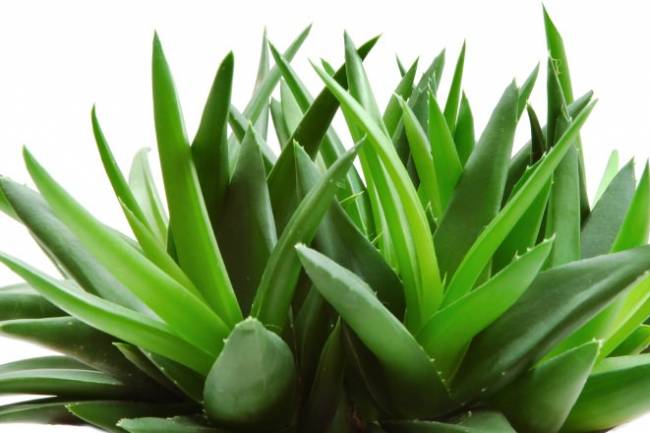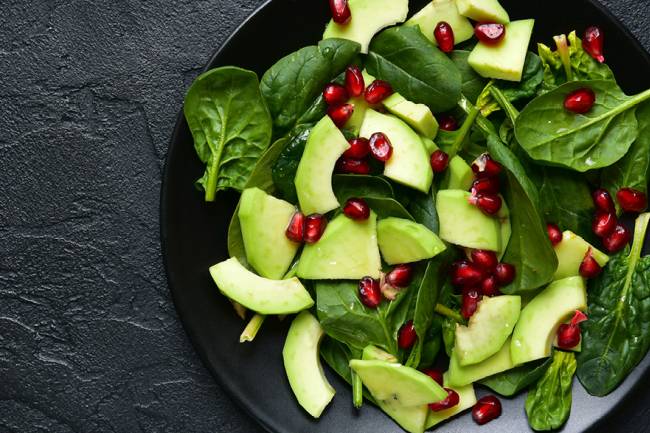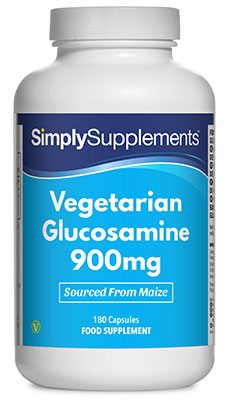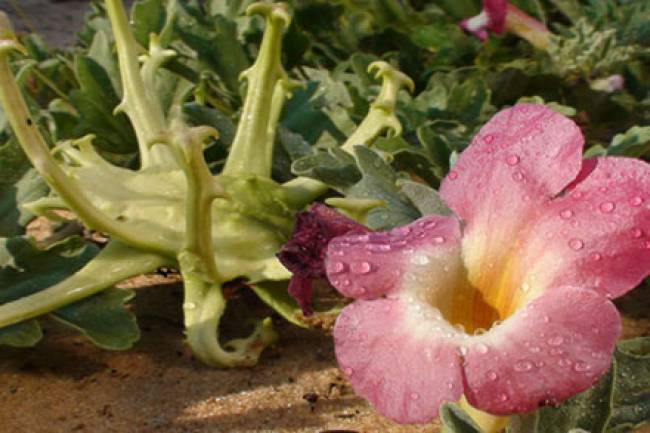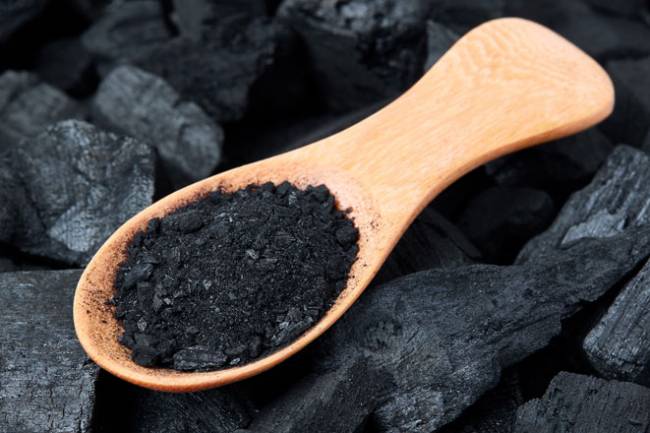Getting Protein from a Vegetarian or Meat-Free Diet
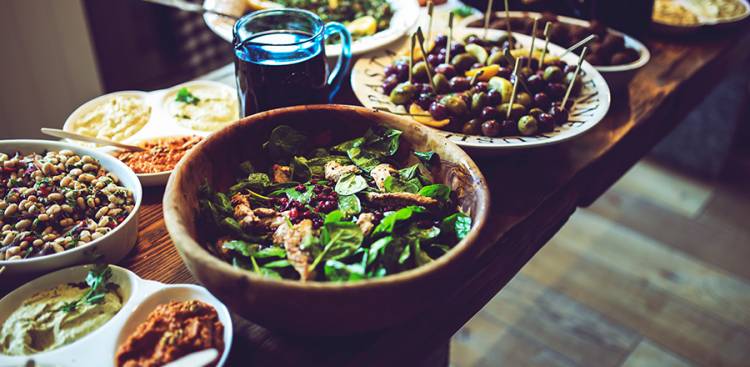
Protein is known to play a variety of incredibly important roles within your body and should make up a large percentage of your day-to-day dietary habits. Although some of the most potent and common sources of protein come from red and white meat, this information isn't helpful to vegetarians, vegans or anyone who has chosen to adopt a meat-free diet. Don't worry though, protein deficiency and a meat-free diet do not go hand-in-hand. There are plenty of other alternatives for you to choose from that ensure you can maintain a healthy intake of protein without having to compromise your lifestyle choices. Before we get into it though, let's take a closer look at protein in general and why it is so important for your body and health.
What Is Protein?
Proteins are nutrients that are essential for all living organisms to function properly. Structurally, they are made up of long chains of amino acids, which are smaller compounds that act as building blocks and can be found throughout the body in cells, muscles and tissue. There are 20 different amino acids that make up protein, 9 of which have been designated as ‘essential amino acids.' These essentials are not naturally produced by your body, meaning that they have to be ingested through the diet. Proteins that contain all 9 of these amino acids are called ‘complete proteins'. Proteins are so prevalent that around 20% of your entire body is made up of them. With this in mind, it's clear to see why maintaining a daily intake is beneficial for different areas of your health.
What Are Proteins Used For?
Due to the sheer variety of different proteins that can be found throughout your body, their uses are just as plentiful. Let's take a look at some of the most prevalent proteins and how they help to support your body.
Skincare and Muscle Development
 Collagen is thought to make up as much as 35% of the protein content in your body because of the structural properties it can provide to skin, muscles, ligaments and other connective tissues. Collagen is found in between each and every skin cell, where it helps to provide benefits such as strength, suppleness and firmness.
Collagen is thought to make up as much as 35% of the protein content in your body because of the structural properties it can provide to skin, muscles, ligaments and other connective tissues. Collagen is found in between each and every skin cell, where it helps to provide benefits such as strength, suppleness and firmness.
Collagen also helps to promote the efficient production of Creatine, which is used to help build new muscle cells, contributing to healthy growth and repair when paired with a comprehensive exercise routine.
Proteins are also used to help heal cuts, scrapes, tears and other dermal injuries you may experience either through accidental causes or surgery. A scientific article published in 2003 stated that “adequate dietary protein is absolutely essential for proper wound healing.” If you're looking to ensure your skin and muscles stay in the best condition possible, a healthy, consistent protein intake is necessary.
Hair, Skin and Nail Health
Keratin is a fibrous protein that can be found in your hair, finger and toe nails, as well as the outer-most layer of the skin. Just like collagen, keratin's role in these areas is to support the production of new cells, as well as provide strength and structure.
Heart Health
Insulin is produced by the pancreas and is used to help regulate glucose levels in the blood. Without this important protein, you could see your blood sugar levels fluctuate, potentially causing more serious heart health issues and possibly even diabetes.
High Protein Foods for Vegans and Vegetarians
Now that you have a good idea of how different proteins help to support different bodily processes and health areas, let's take a look at how you can get protein from a vegetarian or meat-free diet.
Tofu
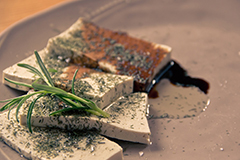 We can't talk about protein for vegetarians and meat-free diets without starting with tofu. Made from mashed up soya beans, tofu serves as the ideal meat replacement in meals. It can be baked, fried, steamed, grilled and manipulated to best fit into your diet, whilst also providing a substantial protein serving. A 100g portion of tofu can contain around 8g of protein, making up 16% of your recommended daily intake. For people who are new to meat-free diets, you might find tofu to be a beneficial meat substitute to help ease you through the initial transition process.
We can't talk about protein for vegetarians and meat-free diets without starting with tofu. Made from mashed up soya beans, tofu serves as the ideal meat replacement in meals. It can be baked, fried, steamed, grilled and manipulated to best fit into your diet, whilst also providing a substantial protein serving. A 100g portion of tofu can contain around 8g of protein, making up 16% of your recommended daily intake. For people who are new to meat-free diets, you might find tofu to be a beneficial meat substitute to help ease you through the initial transition process.
Vegetables
A lot of people don't generally associate vegetables with a healthy protein intake. When compared with meat, no vegetable comes close to matching the protein content of something like skinless chicken breast, with a 100g serving providing up to 27g of protein. However, the protein content of vegetables all add up, so we shouldn't dismiss them when looking to maximise protein in a vegetarian or meat-free diet.
Kale
Kale is renowned for its nutritional content and for good reason. This leafy green vegetable is packed full of a variety of different vitamins and minerals, each one providing a different health benefit to your body. However, you might be surprised to hear that kale is also a fairly good source of plant-based proteins, with a 100g serving providing around 4.3g of protein. Kale can be used in a lot of different meals and recipes, including soups, smoothies, broths, salsas, pastas and even crisps, meaning that you have a lot of different opportunities each day to include it into your diet.
What's more, a 100g serving of kale is known to also contain around 200% of both your recommended daily intake of vitamins A and C. Incorporating kale into your meat-free or vegetarian diet is a good way of ensuring steady protein, coupled with a plethora of beneficial vitamins and minerals at the same time.
Peas
Ordinary garden peas, despite their size, can also serve as another easy way of getting protein from a vegetarian or meat-free diet. A single 100g serving can provide you with around 5g of protein, and just like kale there are a lot of different things you can do with them to make sure that they never get boring.
Brussels Sprouts
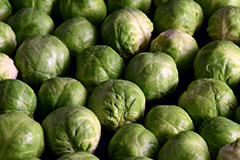 This is a polarising option, but even if you don't like Brussels sprouts, you can't deny their potential benefits. A 100g serving provides 3.4g of protein; 6% of your daily recommended intake. However, they also provide 141% of your daily intake of vitamin C whilst at the same time only adding 43 calories to your diet.
This is a polarising option, but even if you don't like Brussels sprouts, you can't deny their potential benefits. A 100g serving provides 3.4g of protein; 6% of your daily recommended intake. However, they also provide 141% of your daily intake of vitamin C whilst at the same time only adding 43 calories to your diet.
Now a lot of the hatred towards Brussels sprouts might span from the way in which they're cooked. Boiled sprouts don't exactly paint a picture that's going to please the palate, so you need to do some experimenting with different herbs, spices, seasonings and cooking methods to bring something new to the vegetable. There are plenty of combinations out there, so try and find the one that works best for you.
Pulses, Cereals and Grains
Corn
One 100g serving of corn can contain up to 9g of protein, totalling 18% of the daily recommended intake for adults aged between 19 and 64. By introducing corn servings of this size into your diet, you can also enjoy 74g of carbohydrates, and 4.7g of healthy fats. However, be careful not to overdo it with corn, because this same serving size also contains around 360 calories. The daily recommended calorie intake for the average adult is 2000 , meaning that corn can really begin to limit the rest of your diet if you rely on it too much.
Lentils
Lentils, like kale, have very quickly grown to become a staple for all meat-free diets due to their excellent nutritional content, as well as their suitability. Lentils originated in Asia and North Africa, and offer a diverse range of preparation options, because they can be ground into a pulse that can be manipulated into things like burgers, sausages and fritters. 100g of lentils contain 9 grams of protein, 20g of carbohydrates and 8g of dietary fibre, making them a great all-round food that covers a variety of different dietary areas.
Quinoa
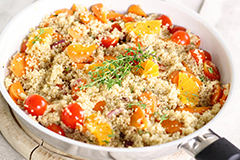 Due to the dietary restrictions of vegetarian and meat-free diets (particularly vegan diets), rice-based dishes are commonly relied upon day in, day out. However, if you're looking to maximise your protein intake, you might want to consider switching from rice to quinoa. Quinoa originated in the high, mountainous regions of the Andes, where it was commonly found in the diets of people in Chile, Peru and Bolivia. The use of quinoa as a food dates back thousands of years, with South American locals calling it the ‘Mother Grain'.
Due to the dietary restrictions of vegetarian and meat-free diets (particularly vegan diets), rice-based dishes are commonly relied upon day in, day out. However, if you're looking to maximise your protein intake, you might want to consider switching from rice to quinoa. Quinoa originated in the high, mountainous regions of the Andes, where it was commonly found in the diets of people in Chile, Peru and Bolivia. The use of quinoa as a food dates back thousands of years, with South American locals calling it the ‘Mother Grain'.
A 100g serving of rice provides just 2.4g of protein, whereas the same serving of quinoa can contain a massive 14g, making it much more beneficial when trying to reach the daily recommended intake of 50g of protein. Quinoa also contains 64g of carbohydrates, 7g of fibre, 6.1g of fat and is gluten-free, meaning that this option makes for a suitable, universal change to ordinary rice dishes without losing out on any important nutrients.
Dairy and Soy Alternatives
The last food area you can turn to for high levels of protein on a vegetarian or meat-free diet are dairy products. Now, even though these are meat-free foods, dairy can't be enjoyed by people who have chosen to adopt a vegan diet or who suffer with lactose intolerance. That's why, where possible, we'll take a look at some of the soy-based plant alternatives that also fall into this category.
Cheese
Cheese is a protein powerhouse, with cheddar cheeses providing a huge 25g of protein per every 100g serving. However, just because a single serving provides 50% of your daily recommended intake of protein, don't think that you can place a significant amount of your dietary responsibilities onto cheese. For every 25g of protein you'll also find 33g of fat, 21g of which is saturated, meaning that excessive consumption can have incredibly detrimental effects on the health of your heart as well as contributing to unhealthy weight gain.
Vegan and lactose-free varieties of cheese are also available that have been manufactured using soy milk, and are more commonly known as cheese analogues. Surprisingly, 100g of a type of this kind of cheese can provide 11g of protein and 12g of fat. Although the ratios showcase the same potential dietary problems as ordinary cheese if consumed excessively, people who abstain from eating meat can at least take some solace in the fact that there are viable options available to suit their lifestyle choices.
Greek Yoghurt and Soy Alternatives
Despite the name, Greek yoghurt didn't actually originate in Greece. Greek yoghurt is just another name for strained yoghurt, which is ordinary yoghurt that has undergone a straining process to remove a high percentage of the whey it naturally contains, which results in a thicker consistency whilst retaining the sour taste. Strained yoghurt is believed to have originated in the Middle East, but today it is enjoyed all over the world for its creamier consistency and higher protein content than more traditional yoghurt varieties. A 100g serving of Greek yogurt can contain up to 10g of protein, whereas more traditional varieties are likely to contain up to 4.4g.
For vegans and people who are lactose intolerant, yoghurts made with soy milk are available as a substitute to those made with cow's milk. However, on average you're only likely to find 3-4g of protein in each 100g serving. Although this is incredibly close to the protein content of ordinary yoghurt and would make for an ideal substitute, this still doesn't come close to matching Greek yoghurt.
Milk and Soy Alternatives
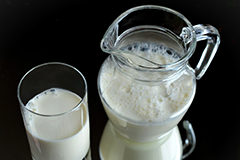 When you really take time to think about it, the average diet likely uses quite a lot of milk on a day-to-day basis. From your bowl of cereal in the morning, to cups of tea or coffee, smoothies and even its use as a cooking and baking ingredient, milk has a plethora of different uses. Luckily though, all of the instances we just mentioned can still be enjoyed by people with a vegetarian or meat-free diet.
When you really take time to think about it, the average diet likely uses quite a lot of milk on a day-to-day basis. From your bowl of cereal in the morning, to cups of tea or coffee, smoothies and even its use as a cooking and baking ingredient, milk has a plethora of different uses. Luckily though, all of the instances we just mentioned can still be enjoyed by people with a vegetarian or meat-free diet.
There are a lot of different cow's milk varieties available at all UK supermarkets, each of which has its own protein content as seen below.
-
Powdered milk – 100g serving contains 26g of protein and 27g of fat.
-
1% milk – 100g serving contains 3.4g of protein and 1g of fat.
-
2% milk – 100g serving contains 3.3g of protein and 2g of fat.
-
3.7% milk – 100g serving contains 3.3g of protein and 3.7g of fat.
-
Non-fat milk – 100g serving contains 3.4g of protein and 0.1g of fat.
Excluding powdered milk as an outlier, the average serving of milk can contain anywhere between 3-4g of protein, providing 6% of your daily recommended intake. Thankfully people who have chosen to adopt a vegetarian or meat free diet are able to enjoy all of these choices. However, vegans and lactose intolerance sufferers require something else that coincides with their lifestyle choices.
The popularity of plant-based milks has risen sharply in recent years, most likely due to the ever-growing popularity of veganism. Because of this rise, there are plenty of different plant milks available, including coconut milk, almond milk, cashew milk and soy milk, to name a few. Soy milk, which is used extensively in the production of other plant-based dairy products, contains 3.3g of protein per 100g serving. If you compare this with the nutritional information of cow's milk we talked about earlier, there isn't much of a nutritional change. The only real difference you'd experience is the taste.
Summary
In this article we've discussed a wide range of foods that can help you to get protein from a vegetarian or meat free diet. The next thing for you to do is figure out which of the options we've highlighted best suits your needs. If you're unsure, however, the best cause of action is to consult your local GP. They will be able to help create an eating plan that ensures you meet the recommended intake of protein and other nutrients whilst also taking your specific lifestyle habits into account.
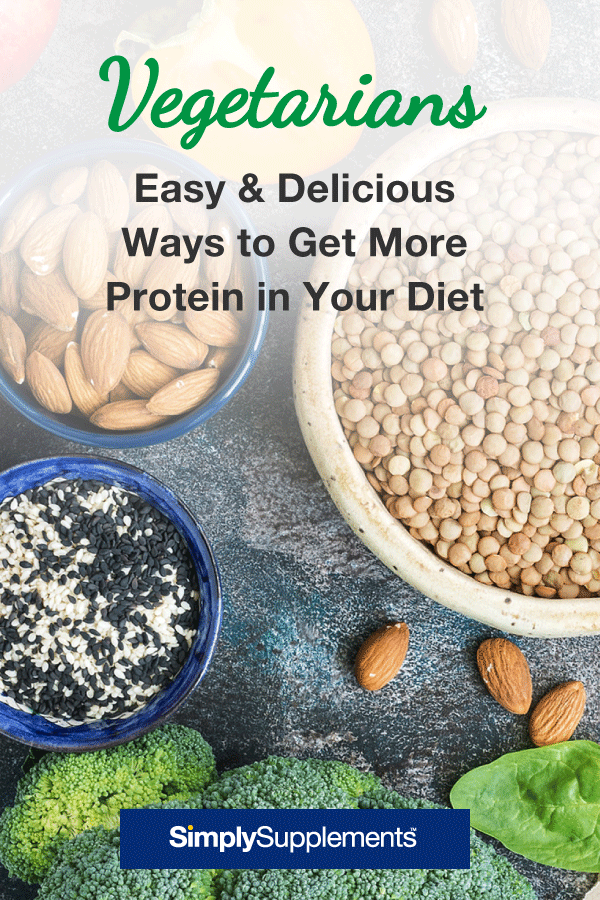
Sources:
http://go.galegroup.com/ps/anonymous?id=GALE%7CA111303980&sid=googleScholar&v=2.1&it=r&linkaccess=fulltext&issn=10895159&p=AONE&sw=w&authCount=1&isAnonymousEntry=true
https://www.nhs.uk/Livewell/Goodfood/Pages/reference-intakes-RI-guideline-daily-amounts-GDA.aspx

 Nicole
Nicole 